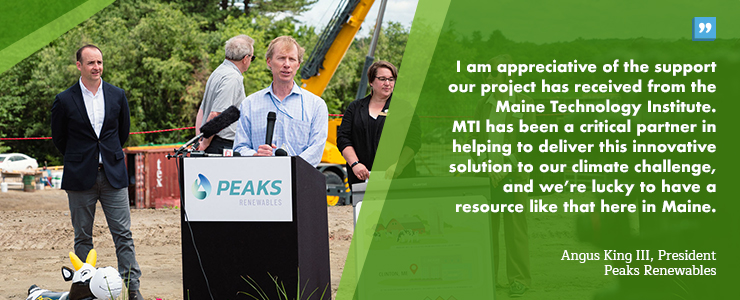Converting Cow Manure into Renewable Energy
Award: $100,000

28,000
The estimated metric tons of carbon dioxide that the Peaks facility will avoid emitting.
130,000 mmbtu
The estimated amount of renewable natural gas production expected per year.
Maine is striving to reach ambitious goals for reducing greenhouse emissions in an effort to stall climate change. A Renewable Natural Gas facility located in Clinton, Maine has the potential to create home-grown renewable natural gas and help support the Maine dairy industry.
Peaks, a subsidiary of Summit Inc., is building an anaerobic digester that will utilize dairy cow manure from local Maine farms and convert it to renewable natural gas.
RNG, also known as biomethane, is derived from the decomposition of naturally occurring organic waste at farms and landfills. If not captured and reused, it would be released into the atmosphere in the form of methane – one of the most potent greenhouse gasses.
On July 6, 2022, Peaks broke ground on the digester, and soon they’ll work with six Maine-based, family-owned dairy farms that will supply the manure. Once in the digester, the manure will be heated and decomposed, creating biogas. The gas then will be cleaned to make it pipeline quality. The gas itself will be purchased by Peaks’ affiliate company, Summit Natural Gas (SNGME), and used to provide reliable gas service to its thousands of customers throughout the state. RNG is functionally identical to traditional natural gas and can be used for heating, cooking, and other processes.
Renewable energy credits will be sold to third parties who need them for their own decarbonization requirements.
After Peaks takes “the energy” from the manure, it will return the nutrient-rich, liquid effluent back to the farm for their fields as well as dry matter for compost and bedding.
MTI has supported Peaks through the engineering, design, and construction of the dairy digester, the first of its kind in Maine. The project opened the door for Summit to be a leader in the development of zero-carbon fuels and drive innovation in the energy sector.
The facility is expected to produce the equivalent of about 45 percent of SNGME’s residential demand.
This project has the potential to move Maine towards greater energy independence while reducing emissions and providing additional support for Maine’s dairy farmers. Currently, Maine is the most heating-oil-dependent state in the country, with more than 60 percent of households reliant on oil to heat their homes in the winter months. Nationally, the dairy industry has pledged to achieve greenhouse gas neutrality by 2050.
MTI’s financial support was integral to the construction of this complex project and is indicative of how Maine values the Maine dairy community and the ability to reach the state’s clean energy and climate targets.
